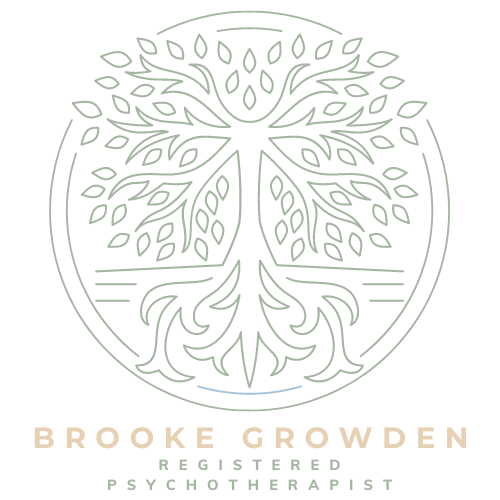Hi, I’m Brooke Growden.
I am a Registered Psychotherapist (Qualifying) with an educational background that includes a Master of Education (MEd), a Master of Arts in Counselling Psychology (MA), and a Doctorate (PhD). I am a former elementary school teacher, and I currently teach Learning, Leadership, and Reflective Practice at the Graduate Studies level. My primary focus is on delivering compassionate counselling and psychotherapy services to individuals and couples navigating the intricate complexities of everyday life.
I am a psychodynamic psychotherapist dedicated to helping individuals and couples explore their inner worlds and navigate life’s challenges. My approach focuses on understanding how your past experiences, trauma, and unconscious thoughts shape your feelings and behaviours today.
In our sessions, you’ll find a safe and supportive space to reflect on your emotions, relationships, and experiences. Together, we’ll work to uncover the roots of any struggles you may be facing—be it anxiety, self-esteem issues, depression, or relationship dynamics.
I believe that gaining insight into your thoughts and feelings can empower you to make positive changes in your life. My goal is to guide you on a journey of self-discovery and personal growth, helping you build healthier relationships with yourself and others.
I understand the vulnerability of self-growth firsthand, as my own personal experiences with the therapeutic process have been healing and transformative as I have navigated profound life change.
If you are ready to explore your inner self and develop greater emotional resilience, I’m here to support you every step of the way.
Practice approaches include….
Trauma-informed care
Psychodynamic Psychotherapy
Attachment-Based Therapy
Flash Technique for Trauma
Rewind Technique for Trauma
Relational Life Therapy (RLT)
Interactive Guided Meditation
Mindfulness-based practice
Compassion Focused
Person-Centred and Strength-Based
Psychodynamic Psychotherapy
Psychodynamic psychotherapy focuses on helping you gain insight into your thoughts, feelings, and behaviours. This approach recognizes that our early relationships and experiences shape how we navigate the world today.
Exploring the Unconscious: Much of our behaviour is influenced by unconscious thoughts and feelings. In our time together we will work to uncover those hidden influences, enabling you to understand yourself better.
Understanding Relationships: Your relationships with family, friends, and significant others play a crucial role in your mental health. By examining these dynamics in therapy, you can gain insights into your patterns of relating to others.
Emotional Awareness: This approach encourages you to explore and process your emotions, helping you develop greater emotional awareness and resilience.
Personal Growth: As you understand the roots of your feelings and behaviours, you can work towards personal growth, healthier relationships, and improved emotional well-being.
For more, check out this video with Johnathan Shedler discussing Meaningful Therapy
Flash Technique for Trauma
The Flash Technique is a therapeutic intervention used in trauma treatment, particularly in cases of post-traumatic stress disorder (PTSD). This technique aims to help individuals process traumatic memories quickly and effectively by reducing the emotional intensity associated with the memory.
During the Flash Technique session, the individual is asked to briefly focus on the traumatic memory while simultaneously bringing to mind a positive or neutral image. This helps create a dual awareness that can diminish the distressing emotions associated with the traumatic event.
Therapists trained in the Flash Technique guide clients through this process, ensuring that the individual feels supported and safe throughout the session. By repeatedly revisiting the traumatic memory while holding onto a positive or neutral image, the emotional charge of the memory is gradually reduced. The effectiveness of the Flash Technique lies in its ability to rapidly reprocess traumatic memories without the individual becoming overwhelmed.
Rewind Technique for Trauma
The Rewind Technique is a specialized therapeutic approach specifically designed to help clients confront and process their traumatic memories, all while avoiding the intense emotional distress often associated with more traditional trauma therapies.
The process begins by creating a safe, relaxed, and trusting environment. Next, the client engages in a detached visualization of the traumatic event, which is akin to watching a movie unfold on a screen. This unique technique helps to minimize intense emotional responses, allowing the client to observe the event without being overwhelmed by feelings of fear, anxiety, or distress. After viewing a detached two minute review of the traumatic event, the client quickly visualizes rewinding the event in their mind, which serves to effectively reduce its emotional impact. This mental exercise helps the brain diminish the intensity of the trauma itself by processing and reorganizing the information. With each repetition, the memory’s emotional intensity is reduced, with the goal of minimizing the emotional distress from the traumatic experience.
The Rewind Technique is particularly beneficial for individuals suffering from PTSD, as it empowers them to reframe their traumatic experiences, regain control over their memories and emotions, and ultimately fosters a profound sense of healing and resilience.

Professional Registrations
College of Registered Psychotherapists of Ontario (CRPO)
Ontario College of Teachers (OCT)
Professional Memberships
Canadian Counselling and Psychotherapy Association (CCPA)
Ontario Association of Mental Health Professionals (OAMHP)


